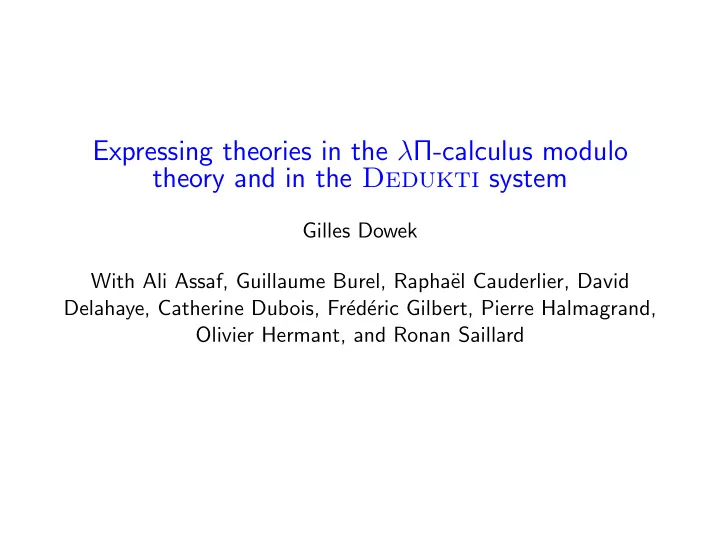

Expressing theories in the λ Π-calculus modulo theory and in the Dedukti system Gilles Dowek With Ali Assaf, Guillaume Burel, Rapha¨ el Cauderlier, David Delahaye, Catherine Dubois, Fr´ ed´ eric Gilbert, Pierre Halmagrand, Olivier Hermant, and Ronan Saillard
Predicate logic (Peano) arithmetic, (Euclide) geometry, (Zermelo) set theory... Theories in Predicate logic (Hilbert and Ackermann, 1928) A logical framework where formalisms can be defined as theories ◮ ∧ , ∨ , ∀ ... defined once for all ◮ proof, model... defined once for all ◮ soundness, completeness... proved once for all ◮ Z ⊆ ZF ⊆ ZFC ◮ if T ⊢ A ⇒ B and T ′ ⊢ A , then T ∪ T ′ ⊢ B
But... The Theory of classes (aka Second-order logic) Simple type theory (aka Higher-order logic) The Calculus of constructions The Calculus of inductive constructions ... not theories expressed in Predicate logic
A Babel tower Before: a proof of xyz (rarely: using the axiom of choice) Now: a Coq proof of the four color theorem”, “an Isabelle/HOL proof of the correctness of seL4” A proof of A in S cannot be used in S ′ A proof of A in S , a proof of A ⇒ B in S ′ , a proof of B in nothing
Five limitations of Predicate logic 1. No bound variables (except ∀ , ∃ ), no function symbol �→ 2. No proofs-as-terms principle 3. No computation: a proof of 2 + 2 = 4 4. No theory-independent cut-elimination theorem 5. No constructive proofs
Partial solutions: more logical frameworks 1. λ -Prolog, Isabelle 1, 2. LF, aka λ Π-calculus, aka λ -calculus with dependent types 3, 4. Deduction modulo theory Combine λ Π-calculus and Deduction modulo theory: λ Π-calculus modulo theory (variant of the Martin-L¨ of logical framework) Solves 1., 2., 3., 4., and 5. Implemented in Dedukti http://dedukti.gforge.inria.fr/
Simple type theory in Dedukti : 8 variables and 3 rules type : Type o : type ι : type arrow : type → type → type η : type → Type η ( arrow a b ) − → η ( a ) → η ( b ) ⇒ : η ( o ) → η ( o ) → η ( o ) ∀ : Π a : type (( η ( a ) → η ( o )) → η ( o )) ε : η ( o ) → Type ε ( ⇒ p q ) − → ε ( p ) → ε ( q ) ε ( ∀ a p ) − → Π x : η ( a ) ε ( p x )
What does “expressing a logic in a framework” means? Adequacy theorem (in principle) Large library of formal proofs translated and checked (in facts)
Dedukti libraries (650 MB) ◮ Constructive predicate logic (Resolution proofs): The iProverModulo TPTP library (38.1 MB) ◮ Classical logic (tableaux proofs): The Zenon modulo Set Theory Library (595 MB) ◮ FoCaLiZe: The Focalide library (1.89 MB) ◮ Simple type theory: The Holide library (21.5 MB) ◮ The Calculus of constructions with universes: The Matita arithmetic library (1.11 MB)
Minimal logic in the λ Π-calculus ι : Type for each variable x , x : ι for each function symbol f , f : ι → ... → ι → ι for each predicate symbol P , P : ι → ... → ι → Type ◮ | x | = x ◮ | f ( t 1 , ..., t n ) | = ( f | t 1 | ... | t n | ) ◮ | P ( t 1 , ..., t n ) | = ( P | t 1 | ... | t n | ) ◮ | A ⇒ B | = | A | → | B | , i.e. Π z : | A | | B | ◮ |∀ x A | = Π x : ι | A | A provable if and only if there exists π such that π : | A |
o aka Prop , bool ... ι : Type , o : Type for each predicate symbol P , P : ι → ... → ι → o ⊤ , ⊥ of type o ⇒ , ∧ , ∨ of type o → o → o ∀ , ∃ of type ( ι → o ) → o o embedded in Type with ε of type o → Type Meaning defined by rewrite rules e.g. ε ( ∧ x y ) − → Π z : o (( ε ( x ) → ε ( y ) → ε ( z )) → ε ( z ))
The impredicative expression of connectives and quantifiers ε ( ∧ x y ) − → Π z : o (( ε ( x ) → ε ( y ) → ε ( z )) → ε ( z )) Π z : o : a quantification over all propositions But... yields a type (: Type ) and not a proposition (: o ) Not even in the image of the embedding ε Propositions-as-types: o ⊑ Type ( ε ) not o = Type
Ongoing work More proofs: PVS (predicate subtyping), Coq (universe polymorphism: rewriting modulo AC), SMT-solvers Reverse engineering of proofs: Half of the HOL-Light standard library is constructive a posteriori Can we express (part of) the Matita arithmetic library in HA?
Recommend
More recommend